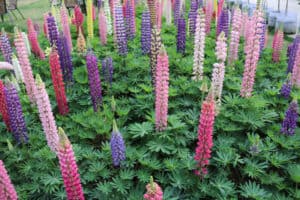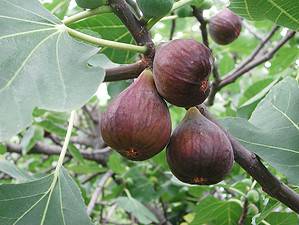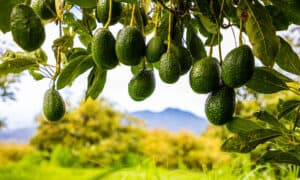Aphids, also known as greenflies, are pesky insects that can destroy your beautiful rose bushes. These sap-suckers are a common garden pest that, when left unchecked, will permanently damage the buds, stems, and leaves before you know it.
There are many ways to get rid of aphids on roses, including attracting aphid predators to your garden, such as sparrows, keeping your plants healthy, preventing overfertilizing, and applying neem oil to deter the insects.
Let’s look at what aphids are, what damage they can do to your roses, and how to eliminate them!
What Are Aphids?
While around 5,000 species of aphids are in the family Aphididae, two species commonly get found on roses and other flowering plants. These include the rose aphid (Macrosiphum rosae) and the potato aphid (Macrosiphum euphorbiae). The color of aphids will vary according to species. They can be found in various colors ranging from brown, black, grey, white, pink, or light green.
Aphids are little soft-bodied, slow-moving insects that weaken plants by feeding on the liquids in the flowers and leaves. They have an egg-shaped body that’s between 0.7-0.14 inches long. Females can breed rapidly and develop wings to colonize other plants later in the season. However, most species of aphids are wingless. So while you may see single aphids or small groups, they breed fairly quickly, and groups will get crowded in no time.
You might be wondering how you can identify aphids on your roses. While you can see them with the naked eye underneath the leaves or on flower tips, there are some common indicators.
Aphids suck the sap out of flowering plants. This sap is what keeps your plant healthy and thriving. Aphids are essentially sucking the life out of your plant. Symptoms to look out for include:
- Wilted, curled, or discolored leaves
- Sticky honeydew on the leaves caused by aphid secretions
- The honeydew can cause mold
- Rosebuds will become dull and deformed
- Flowers and leaves fall off the plant
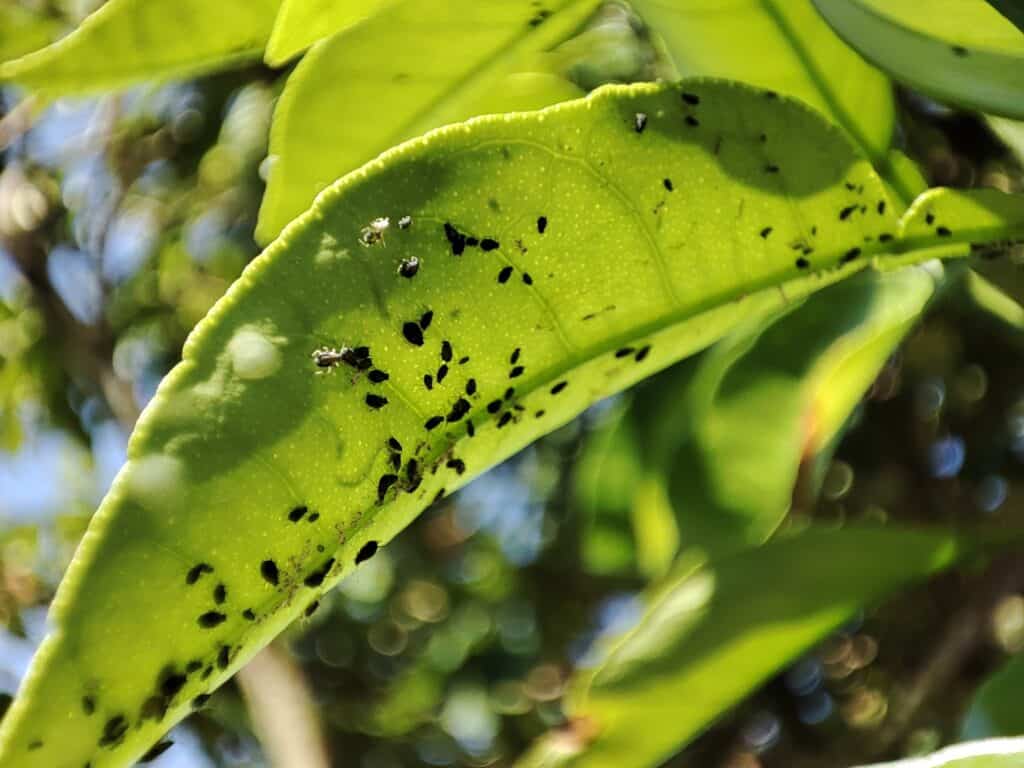
Aphids are little insects with soft bodies that suck the sap from the plant, leaving it dry and crinkled.
©jamaludinyusuppp/Shutterstock.com
Natural Methods to Get Rid of Aphids on Roses
Whether you brought home aphids from the nursey when purchasing new plants or winged ones flew to your rose bushes from other plants, the best thing you can do is catch it early and start treatment immediately. Chemical treatments aren’t for everyone, but natural methods successfully treat aphids on roses.
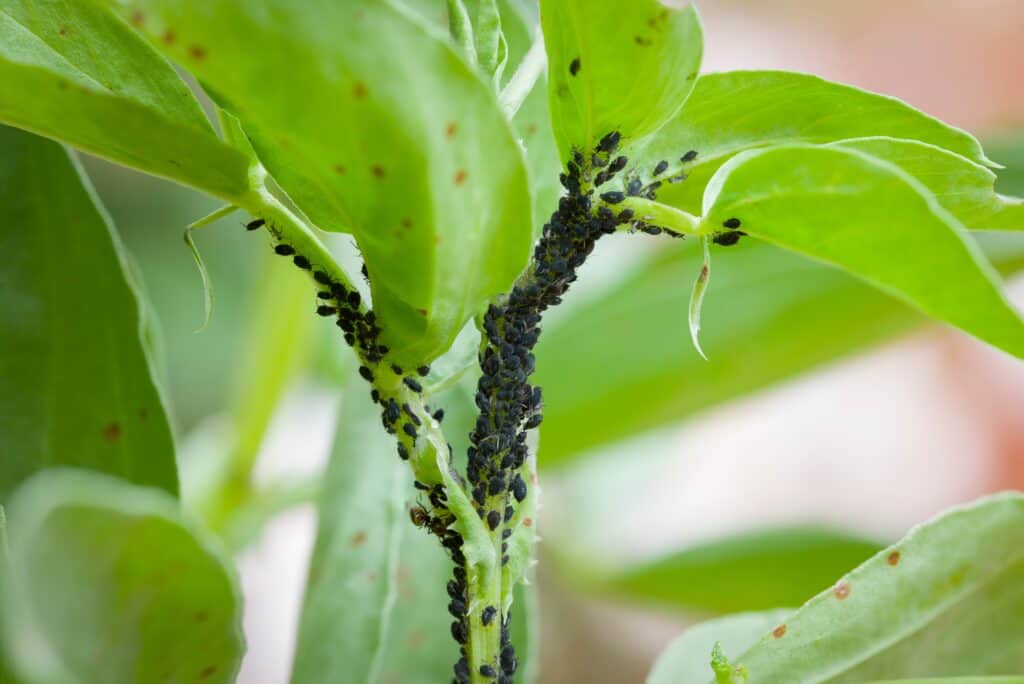
If you notice a few aphids on your roses, you’ll want to get rid of them as soon as possible, as this will help prevent them from spreading to other plants in your garden.
©Paul Maguire/Shutterstock.com
1. Manual Removal
Manually removing aphids will work great if you have smaller rose plants. Put on garden gloves and remove all visible aphids. If there is a lot, use a paper towel to brush off larger groups. Next, you can use a garden hose to forcefully spray off groups of aphids on the underside of the leaves. Do this a couple of times a day for efficiency.
When all the aphids have been removed, prune the dying or dead leaves and stems. If you find large groups of aphids challenging to remove, pruning those stems is also effective. In addition, pruning your rose bushes will refresh them and encourage new growth from where the damage occurred.
2. Natural Aphid Spray
There are many recipes for making natural aphid spray. One of the most common is a dish soap solution. First, add a few drops of organic dish soap to a bucket of water, then pour it into a spray bottle. Next, spray the whole rose bush with the solution and get the underside of the leaves where aphids hide. The soapy solution will suffocate the aphids.
Remember to spray the rose bushes with the solution in the morning or evening as the day’s heat could dry out the plant. After treatment, rinse off the bush entirely.
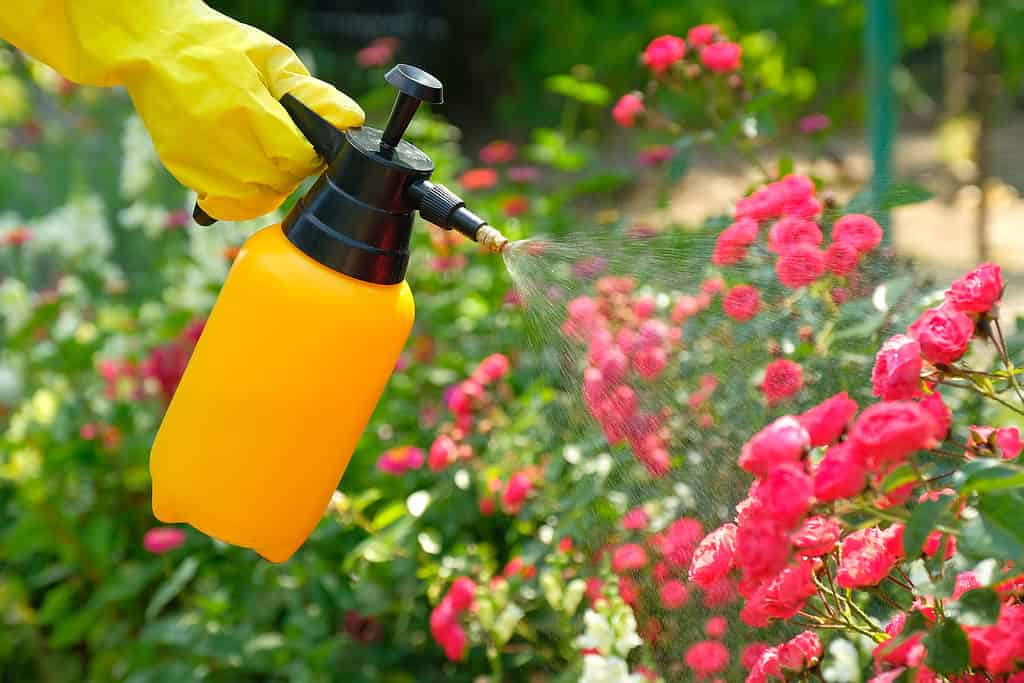
Use organic dish soap and water to spray rose bushes to kill aphids.
©Savanevich Viktar/Shutterstock.com
3. Neem Oil
Neem trees (Azadirachta indica) got used to treat ailments for centuries. Today, developing countries still rely on neem for traditional medicine. Neem oil is also an effective, non-toxic natural pesticide that smothers aphids and prevents them from moving and feeding.
Mix 5ml (1 teaspoon) of neem oil and 2ml of organic dish soap in 4 cups of warm water. Mix the solution and put it into a spray bottle. Spray the entire rose plant, including rose buds, leaves, and stems. Go ahead and repeat the process if you still see aphids on the plant.
4. Vinegar Aphid Spray
Vinegar spray is another great natural aphid removal treatment. Mix 2 oz of vinegar with 6 oz of water in a spray bottle. Next, spray the infected plant and repeat as needed a week later. However, you need to approach this method with caution.
Vinegar should get diluted to prevent withering and damage to your plants. High concentrations of vinegar are likely to make leaves turn brown and may even cause the plant to become dull and lose its vigor. Instead of using a concentrated solution that could harm your plant, repeatedly spray a very diluted vinegar solution on your plants to get rid of aphids and other pests.
5. Introducing Aphid Predators
Introducing aphid predators is an excellent way to eliminate aphid infestations naturally. Aphids’ natural enemies are ladybugs, ground beetles, soldier beetles, green lacewings, and hoverflies. You can attract these bugs by growing mint, thyme, dill, coriander, and Queen Anne’s lace or purchasing live insects like ladybugs from the local nursery or online.
Food is not the only thing insects are attracted to. They require healthy foliage for shelter, such as wildflowers and herbs, that can offer a safe place for insects to rest and lay their eggs. In addition, adding a variety of different plants will attract a variety of insects.
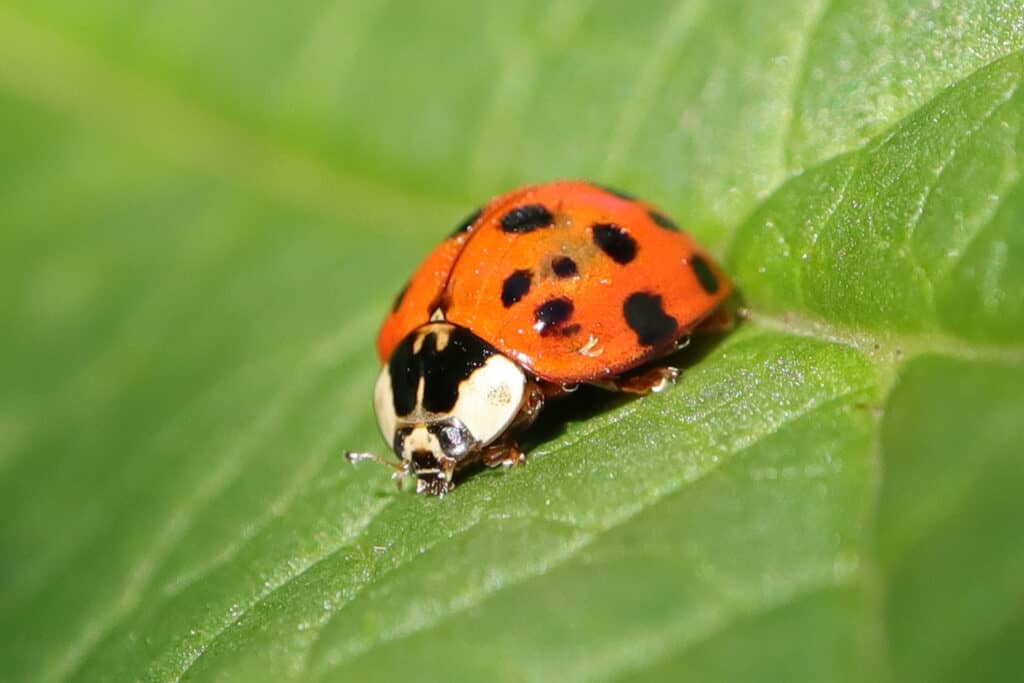
Ladybugs (pictured) are a natural enemy of aphids.
©iStock.com/DE1967
6. Keep Plants Healthy
Keep a close eye on your roses, and ensure they stay healthy. Inspect them often and see if aphids or other insects harm the plants. Early detection and treatment are great ways to combat aphid infestations.
It’s important to note that when purchasing new plants from the nursery, carefully inspect the plant to ensure no aphids or other insects could spread and damage plants.
Insecticides
There is an enormous amount of insecticide products on the market. But which one should you purchase? First, choose an insecticide that has an aphid label on the bottle. Then, take a look at the instructions. Do they require multiple applications, and can they damage insecticide-sensitive plants surrounding the treated plant?
Use caution when choosing an insecticide, as it could kill the insects you want to attract. In addition, selecting the wrong type of insecticide with too many chemicals may harm your other plants. Signs of insecticide damage include:
- Leaf drop
- Leaf burn
- Curled leaves
- Dead plants
- Discolored leaves
- Abnormal plant growth
Final Thoughts
Even the most beautiful rose can get ruined by an infestation of these tiny insects. Fortunately, plenty of ways to protect your favorite flowers from these pesky bugs exist. Natural remedies are effective, simple, and ideal for environmentally conscious gardeners. Your roses just need a little more care than usual.
After removing the aphids from your rose bush, ensure it gets plenty of water to restore itself after being attacked by pests like these little guys. You’ll need to keep up with regular watering even if there aren’t any more in sight.
The photo featured at the top of this post is © Tomasz Klejdysz/Shutterstock.com
Thank you for reading! Have some feedback for us? Contact the AZ Animals editorial team.



